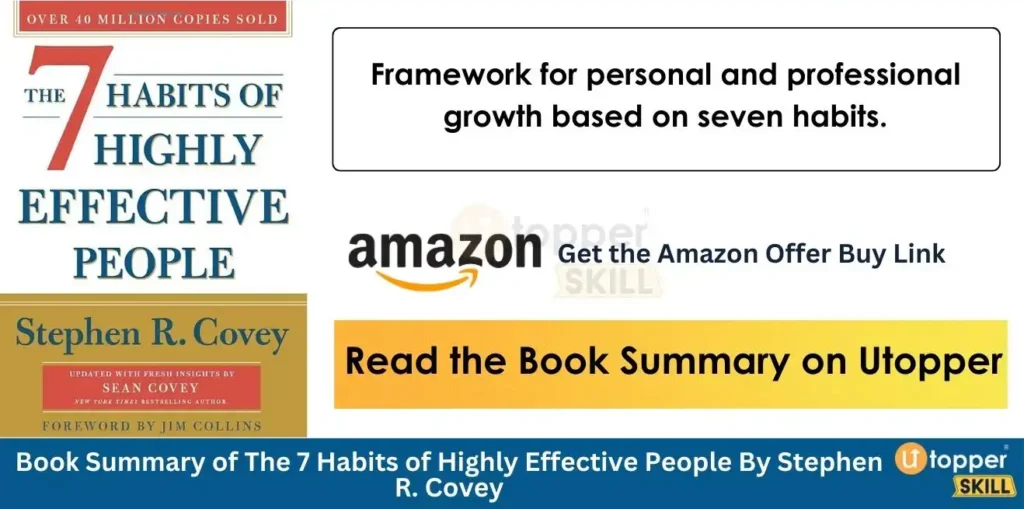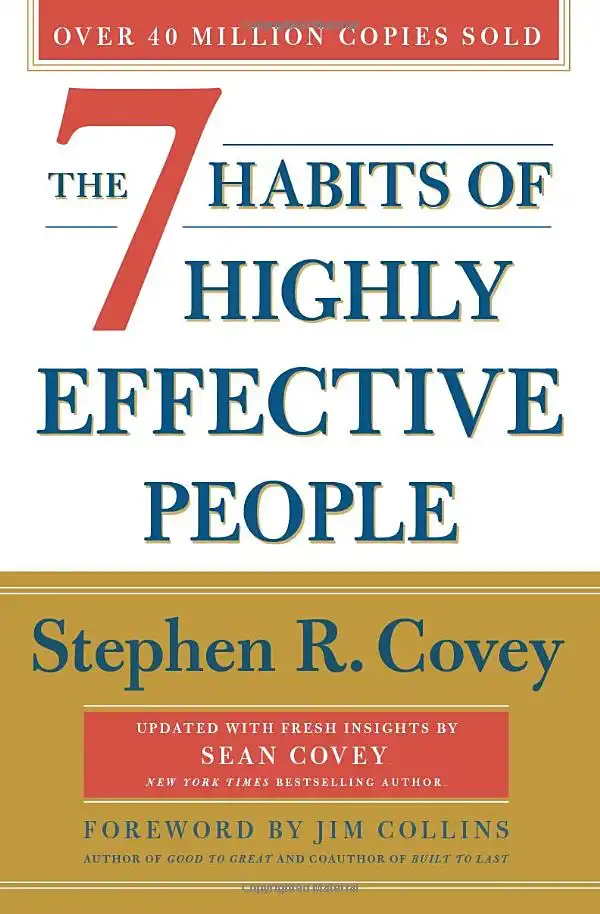[adinserter block=”1″]
Book Summary of The 7 Habits of Highly Effective People

[adinserter block=”2″]
The 7 Habits of Highly Effective People: A Summary
Stephen R. Covey’s book, The 7 Habits of Highly Effective People, is a classic self-help book that has sold millions of copies worldwide since its publication in 1989.
“7 Habits of Highly Effective People“ is a framework for personal and professional growth based on seven habits that Covey claims are essential for success.
In this article, we are Writing a Book Summary of The 7 Habits of Highly Effective People, 1 Line summary of The 7 Habits of Highly Effective People, the Best quotes of The 7 Habits of Highly Effective People and the Best Lines of The 7 Habits of Highly Effective People.
1 Line Summary of the Book
It is a framework for personal and professional growth based on seven habits that are essential for success.
Brief Summary of “The 7 Habits of Highly Effective People”
Habit 1: Be Proactive
The first habit that Covey recommends is to be proactive. He suggests that individuals should take responsibility for their own lives, instead of blaming others for their circumstances. Covey writes, “Proactive people are driven by values that they have chosen for themselves.”
Habit 2: Begin with the End in Mind
The second habit is to begin with the end in mind. Covey argues that individuals should have a clear vision of what they want to achieve in life, whether it’s in their personal or professional life. He writes, “Begin with the end in mind means to begin each day, task, or project with a clear vision of your desired direction and destination.”
Habit 3: Put First Things First
The third habit is to put first things first. Covey explains that individuals should prioritize their time and focus on what’s important. He writes, “Put first things first involves organizing and managing time and events based on the personal priorities established in habit 2.”
Habit 4: Think Win-Win
The fourth habit is to think win-win. Covey suggests that individuals should seek mutual benefit in all interactions, instead of trying to win at the expense of others. He writes, “Think Win-Win isn’t about being nice, nor is it a quick-fix technique. It is a character-based code for human interaction and collaboration.”
[adinserter block=”3″]
Habit 5: Seek First to Understand, Then to Be Understood
The fifth habit is to seek first to understand, then to be understood. Covey emphasizes the importance of active listening and empathy in effective communication. He writes, “Seek first to understand involves a very deep shift in paradigm. We typically seek first to be understood. Instead, most people listen to the reply, not to understand.”
Habit 6: Synergize
The sixth habit is to synergize. Covey defines synergy as “the whole is greater than the sum of its parts.” He suggests that individuals should work together to create something that is greater than what they could achieve individually. He writes, “Synergy is the essence of principle-centred leadership.”
Habit 7: Sharpen the Saw
The seventh habit is to sharpen the saw. Covey uses the metaphor of a woodcutter that keeps sawing with a dull saw instead of taking the time to sharpen it. He suggests that individuals should take care of their physical, mental, emotional, and spiritual well-being to be more effective. He writes, “Sharpen the Saw means preserving and enhancing the greatest asset you have—you.”
[adinserter block=”4″]
Chapter Summary of “The 7 Habits of Highly Effective People”
Chapter 1: Introduction
In the introduction, Covey explains his philosophy of “inside-out” development, in which individuals must focus on developing their character and values before they can achieve success in their personal and professional lives.
Chapter 2: Paradigms and Principles
In this chapter, Covey explains the difference between paradigms (the way we see and interpret the world) and principles (fundamental truths that govern human behaviour). He argues that individuals should focus on principles rather than paradigms to achieve success.
Chapter 3: Personal Vision
Chapter 3 focuses on the second habit, “Begin with the End in Mind.” Covey encourages readers to develop a personal vision statement that outlines their values and goals for their lives.
Chapter 4: Time Management
Chapter 4 is about the third habit, “Put First Things First.” Covey provides a framework for time management based on four quadrants that represent different types of tasks and priorities.
[adinserter block=”7″]
Chapter 5: Interdependence
In this chapter, Covey introduces the fourth habit, “Think Win-Win.” He emphasizes the importance of building positive, mutually beneficial relationships with others based on trust and respect.
Chapter 6: Emphatic Communication
Chapter 6 focuses on the fifth habit, “Seek First to Understand, Then to Be Understood.” Covey provides techniques for active listening and empathic communication to improve relationships and resolve conflicts.
Chapter 7: Synergy
In Chapter 7, Covey explains the concept of synergy, which is the sixth habit. He emphasizes the importance of collaboration and creative cooperation to achieve results that are greater than what individuals could achieve alone.
Chapter 8: Continuous Improvement
Chapter 8 is about the seventh habit, “Sharpen the Saw.” Covey encourages readers to take care of their physical, mental, emotional, and spiritual well-being through activities such as exercise, reading, meditation, and service.
[adinserter block=”4″]
Chapter 9: Conclusion
In the final chapter, Covey summarizes the seven habits and emphasizes the importance of ongoing personal and professional development through the application of these habits.
BUY “The 7 Habits of Highly Effective People”
“The 7 Habits of Highly Effective People” by Stephen R. Covey provides a framework for personal and professional growth based on seven habits that are essential for success.
Conclusion
The 7 Habits of Highly Effective People is a timeless book that offers valuable insights for personal and professional growth. Covey’s seven habits provide a practical framework for individuals who want to achieve success in all areas of their lives. The book emphasizes the importance of taking responsibility, having a clear vision, prioritizing, seeking mutual benefit, active listening, collaboration, and self-care.
Best Quotes of “The 7 Habits of Highly Effective People”
- “Begin with the end in mind.”
- “Habit is the intersection of knowledge (what to do), skill (how to do), and desire (want to do).”
- “The key is not to prioritize what’s on your schedule, but to schedule your priorities.”
- “The most important thing in communication is hearing what isn’t said.”
- “Strength lies in differences, not in similarities.”
- “Trust is the glue of life. It’s the most essential ingredient in effective communication. It’s the foundational principle that holds all relationships.”
- “To change ourselves effectively, we first had to change our perceptions.”
- “I am not a product of my circumstances. I am a product of my decisions.”
- “Live out of your imagination, not your history.”
- “There are three constants in life: change, choice, and principles.”
[adinserter block=”2″]
Best Lines of “The 7 Habits of Highly Effective People”
- “Most people do not listen with the intent to understand; they listen with the intent to reply.”
- “The main thing is to keep the main thing the main thing.”
- “You can’t talk your way out of problems you behave your way into.”
- “We see the world, not as it is, but as we are or, as we are conditioned to see it.”
- “There’s no such thing as business ethics; there’s just ethics.”
- “We are not human beings having a spiritual experience. We are spiritual beings having a human experience.”
- “You have to decide what your highest priorities are and have the courage, pleasantly, smilingly, non-apologetically to say ‘no’ to other things. And the way to do that is by having a bigger ‘yes’ burning inside.”
- “Strength lies in differences, not in similarities.”
- “The key is not to prioritize what’s on your schedule, but to schedule your priorities.”
- “You have to water the flowers you want to grow.”
“The 7 Habits of Highly Effective People” By Stephen R. Covey

The book is a framework for personal and professional growth based on seven habits that are essential for success.
- “You can’t talk your way out of problems you behave your way into.”
- “Live out of your imagination, not your history.”
- “We are not human beings having a spiritual experience. We are spiritual beings having a human experience.”
- “Strength lies in differences, not in similarities.”
Lessons to learn from “The 7 Habits of Highly Effective People”
- Take responsibility for your own life and focus on developing your character and values.
- Have a clear vision of what you want to achieve in life and begin with the end in mind.
- Prioritize your time and focus on what’s important by putting first things first.
- Seek mutual benefit in all interactions and practice active listening and empathy in effective communication.
- Work together with others to create something that is greater than what you could achieve individually.
- Take care of your physical, mental, emotional, and spiritual well-being to be more effective.
- Develop a habit of continuous improvement and apply the seven habits regularly to achieve personal and professional success.
[adinserter block=”2″]
Frequently Asked Questions on “The 7 Habits of Highly Effective People”
Q.1 What is the main message of the book?
The book provides a framework for personal and professional growth based on seven habits that are essential for success. The habits include being proactive, beginning with the end in mind, putting first things first, thinking win-win, seeking first to understand, then to be understood, synergizing, and sharpening the saw.
Q.2 Is this book only for business people?
No, the book is relevant for anyone who wants to improve their personal or professional life. The habits can be applied in any area of life, including relationships, family, and personal growth.
Q.3 Is this book easy to read?
Yes, the book is written in simple and clear language, and the concepts are explained in a practical and relatable way.
Q.4 Is this book still relevant today?
Yes, the book is still relevant today, more than 30 years after its publication. The seven habits provide timeless principles for personal and professional growth, and the book has helped millions of readers worldwide to achieve success and fulfilment in their lives.
Q.5 Can the seven habits be applied in any culture?
Yes, the seven habits are universal principles that can be applied in any culture or society. The habits are based on fundamental truths about human behaviour and are relevant for people from all walks of life.
Q.6 Can the habits be learned and developed?
Yes, habits can be learned and developed through conscious effort and practice. The book provides practical techniques and exercises to help readers apply the habits in their daily lives.
Q.7 What is the significance of the title, “The 7 Habits of Highly Effective People”?
The title emphasizes the importance of habits in achieving personal and professional success. The book suggests that highly effective people have developed certain habits that enable them to achieve their goals and live fulfilling lives.
